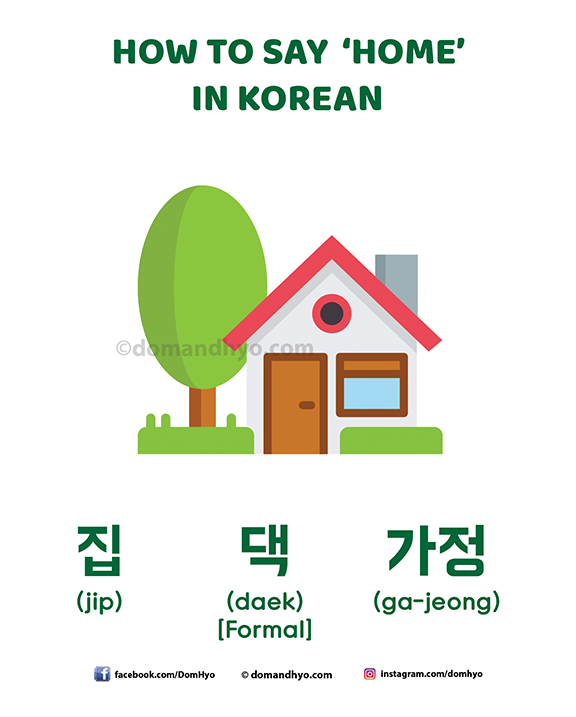
A home is like your castle. Your refuge to go and feel comfortable away from all the stresses and problems of life. How would you say home in Korean? Let’s show you how today!
There are a few words you can use to refer to your home in Korean. We’ll go through the common words and then the more nuanced and formal types of words you can use.
집 (jip)
I’m sure many of you may already be familiar with this word if you’ve started to learn Korean. It’s one of the easiest words to learn, and one of the first words to learn. It’s short, easy, and simple to pronounce. This word usually refers to the actual structure of the house. The physical place that you go to after work, where you sleep, eat, etc. The final consonant has an abrupt end to its pronunciation, so keep that in mind.
Here are some example sentences:
집이야? (ji-bi-ya) = Are you home? (casual)
집에 간다. (ji-be gan-da) = I’m going home.
나는 택시로 집에 왔다. (na-neun taek-ssi-ro ji-be wat-tta) = I came home by taxi.
What’s interesting about this word, is that it’s used to make new slang words (especially in reference to a type of restaurant). 식당 is the word for restaurant, but these words have turned 집 into the same meaning.
Here are some examples of what we’re talking about:
맛집 (mat-jjip) = a tasty restaurant (맛 means taste)
횟집 (hoet-jjip) = Raw fish restaurant
만두집 (man-du-jip) = Dumpling restaurant
댁 (daek)
This is the formal/honorific word for home or house. You would use this with older people (especially in reference to someone’s grandparents). Using this word when speaking with your elders will show them that you’re really trying to be respectful. Here are some examples:
내일 할머니 댁에 가요. (nae-il hal-meo-ni dae-ge ga-yo) = I’m going to my grandmother’s house tomorrow.
여기는 저희 할머니댁이에요. (yeo-gi-neun jeo-hi hal-meo-ni-dae-gi-e-yo) = This is my grandmother’s house.
할머니댁은 강원도 속초입니다. (hal-meo-ni-dae-geun gang-won-do sok-cho-im-ni-da) = My grandmother’s house is in Sokcho, Gangwando.
As you can see, it’s mostly used when you’re referencing your grandparent’s house.

보금자리 (bo-geum-ja-ri)
If you look up this word in a Korean dictionary, you’ll find it means ‘nest’. However, this word can also take on the meaning of home. With this word, the meaning of home is more of a cozy, warm, and personal space (like a bird’s nest). It’s more personal and has more of that ‘my castle’ type of feeling when referring to your house or home.
가정 (ga-geong)
This word refers to your household. You know, the members of your family that all live under one roof. So this word is not really referring to the physical structure or place, but relates to people. Some people might get this confused with ‘가족’ which means family, but the key difference is the people that actually live with you. For example, your grandma is part of your family, but she doesn’t live with you, so she’s not part of your household. You will see this word used as family as well though.
나는 좋은 가정에서 자랐다. (na-neun jo-eun ga-jeong-e-seo ja-rat-tta) = I grew up in a nice home.
나는 가정과 직장에 만족한다. (na-neun ga-jeong-gwa jik-jjang-e man-jo-kan-da) = I’m content at home and work.
주택 (ju-taek)
This is another formal way to refer to your home. You’ll find this used in real estate listings a lot.
고향 (go-hyang)
This means your hometown. Lots of beginners confuse this word with 고양이 (cat) when they first start learning Korean. This is a great word to use and know. When talking with Koreans you first meet, you’ll hear them ask you ‘고향이 어디세요?’ (go-hyang-i eo-di-se-yo) which means ‘Where is your hometown?’. Here are some more examples:
제 고향은 Detroit입니다. (je go-hyang-eun Detroit-im-ni-da) = My hometown is Detroit.
너의 고향에 대해 말해줘. (neo-ui go-hyang-e dae-hae mal-hae-jjwo) = Tell me about your hometown.
These were quite a few words right? There are actually a few more, but you won’t really hear them often. You can’t go wrong with the above words, so study and review them! Until next time.
